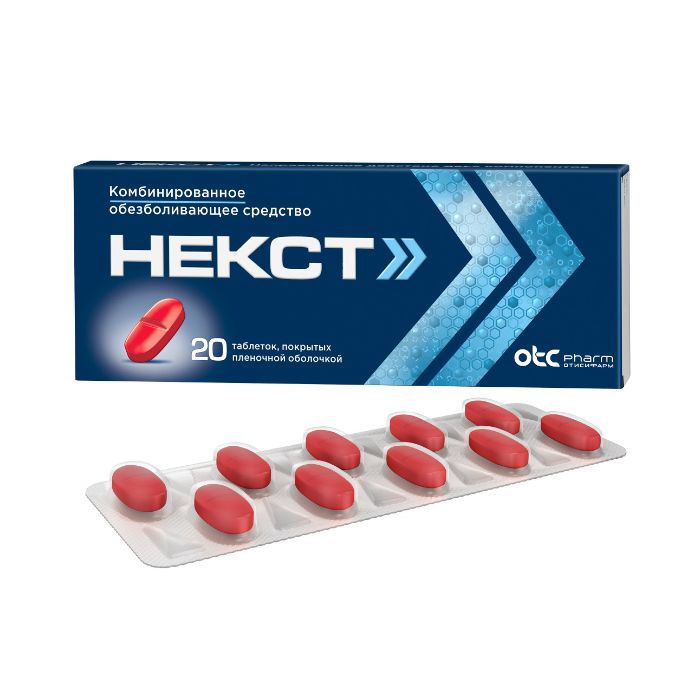, Paracetamol | Nekst tablets 400 mg + 200 mg 20 pcs.
Special Price
$32
Regular Price
$39
In stock
SKU
BID490524
release form
tablets
Packaging
20 pcs
Pharmacological action
Next - a combined drug that has analgesic, anti-inflammatory and antipyretic effects.
Paracetamol is a non-narcotic analgesic that has an antipyretic and analgesic effect due to the blockade of cyclooxygenase in the central nervous system and the effect on the centers of pain and thermoregulation.
Ibuprofen is a non-steroidal anti-inflammatory drug that has analgesic, anti-inflammatory and antipyretic effects associated with non-selective suppression of cyclooxygenase activity that regulates prostaglandin synthesis.
The components of the drug act as a central and on the peripheral mechanisms of the formation of pain. The directed, complementary effect of the two components has a quick therapeutic effect and a pronounced analgesic effect.
Indications
headache (including migraine)
toothache
algodismenorrhea (painful menstruation)
neuralgia
myalgia
back pain
joint pain, pain syndrome for inflammatory and painful pain and inflammatory disease dislocation
fractures post-traumatic and postoperative pain syndrome
febrile conditions (including those with flu and colds).
Contraindications
hypersensitivity to the components of the drug
erosive and ulcerative diseases of the gastrointestinal tract (in the exacerbation phase), gastrointestinal bleeding
severe hepatic and / or renal failure
bleeding hemorrhage, time longevity ( bleeding, hemorrhagic diathesis)
complete or incomplete combination of bronchial asthma, recurrent polyposis of the nose and paranasal sinuses and intolerance to acetylsalicylic isloty or other nonsteroidal anti-inflammatory drugs, including history of
condition after coronary artery bypass grafting
confirmed hyperkalemia
glucose-6-phosphate dehydrogenase deficiency
children under 12 years of age.
Precautions: Chronic heart failure, viral hepatitis, alcoholic liver damage, hepatic and / or renal failure of moderate and mild severity, benign hyperbilirubinemia (Gilbert, Dubin-Johnson and Rotor syndrome), liver cirrhosis with portal hypertension, nephrotic diabetes, diseases of the peripheral arteries, peptic ulcer of the stomach and duodenum (history) gastritis, enteritis, colitis asthma, bronchospasm elderly pregnancy (I and II rimestry - the application can only be prescribed by a doctor in those cases, when the potential benefit exceeds the possible risk).
Use during pregnancy and lactation
The use of the drug in the third trimester of pregnancy is contraindicated.
If you need to use the drug in the I and II trimester of pregnancy, you should be careful - use is possible only as directed by the doctor in cases where the potential benefit exceeds the possible risk.
During breastfeeding, if necessary, the use of the drug should stop breast-feeding.
Dosage and administration of
NEXT tablets are taken orally after a meal.
Adults: 1 tablet 3 times a day. The maximum daily dose is 3 tablets.
Children over 12 years old (body weight over 40 kg): 1 tablet 2 times a day.
Duration of treatment is not more than 3 days as an antipyretic and not more than 5 days as an anesthetic.
Continuation of treatment with the drug is possible only after consulting a doctor.
Side effects
From the nervous system: headache, dizziness, sleep disturbances, anxiety, depression.
From the cardiovascular system: tachycardia, increased blood pressure, heart failure.
From the respiratory system: shortness of breath, bronchospasm.
From the gastrointestinal tract: abdominal pain, nausea, vomiting, heartburn, decreased appetite, diarrhea or constipation, flatulence, ulceration of the gum mucosa, aphthous stomatitis, pancreatitis.
Sensory organs: hearing impairment, ringing or tinnitus, blurred vision, blurred vision or diplopia, dryness and irritation of the eyes.
From the urinary system: acute renal failure, nephrotic syndrome, polyuria, cystitis.
Allergic reactions: skin rash, pruritus, allergic rhinitis, angioedema, erythema multiforme exudative (including Stevens-Johnson syndrome), toxic epidermal necrolysis (Lyell's syndrome).
From the hemopoietic organs: anemia, thrombocytopenia, thrombocytopenic purpura, agranulocytosis, leukopenia, eosinophilia.
With prolonged use in large doses - hepatotoxic and nephrotoxic (hepatitis, interstitial nephritis and papillary necrosis), hemolytic anemia, aplastic anemia, methemoglobinemia, pancytopenia.
Drug Interaction
Inductors of microsomal oxidation in the liver (phenytoin, ethanol, barbiturates, flumecinol, rifampicin, phenylbutazone, tricyclic antidepressants) increase the production of hydroxylated metabolic acid,
Microsomal oxidation inhibitors (including cimetidine) reduce the risk of hepatotoxic action.
Myelotoxic drugs increase the hematotoxicity of the drug.
The combination of ibuprofen with ethanol, glucocorticosteroids increases the risk of erosive and ulcerative lesions of the gastrointestinal tract.
Concomitant use of paracetamol with ethanol increases the risk of acute pancreatitis.
Paracetamol and ibuprofen enhance the effect of indirect anticoagulants and reduce the effectiveness of uricosuric drugs.
Prolonged use of barbiturates reduces the effectiveness of paracetamol.
Diflunisal increases the plasma concentration of paracetamol by 50%, which increases the risk of hepatotoxicity.
Ibuprofen lowers the antihypertensive activity of vasodilators, natriuretic and diuretic - furosemide and hydrochlorothiazide.
Antacids and cholestyramine reduce ibuprofen absorption.
Ibuprofen enhances the effect of oral hypoglycemic agents and insulin.
Ibuprofen increases blood concentrations of digoxin, lithium and methotrexate.
When co-administered with acetylsalicylic acid, ibuprofen reduces its anti-inflammatory and anti-aggregating effects.
Cefamandol, cefaperazone, cefotetan, valproic acid, plicamycin increase the incidence of hypoprothrombinemia.
Overdose
Symptoms: abdominal pain, nausea, vomiting, agitation or inhibition, drowsiness, confusion, tachycardia, arrhythmia, acute renal failure, metabolic acidosis, increased urinary tract, increased urinary tract, »Transaminase, increase in prothrombin time. If overdose is suspected, seek medical attention immediately.
Treatment: gastric lavage, followed by the appointment of activated carbon alkaline drink, forced diuresis, symptomatic therapy.
Storage conditions
At a temperature not exceeding 25 РC.
Keep out of the reach of children.
Expiration
2 Year
Terms
pharmacy leave without a prescription
dosage form
dosage form
tablets
Submit your review to Earn 10 Reward Points click here to login
Write Your Own Review

